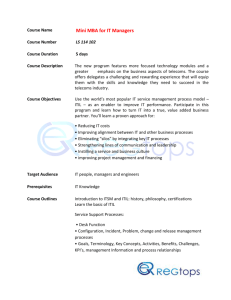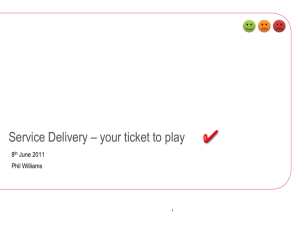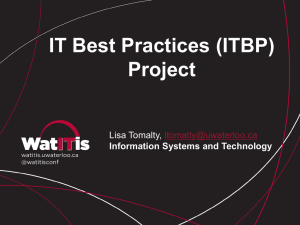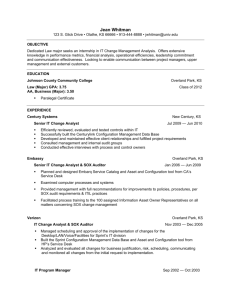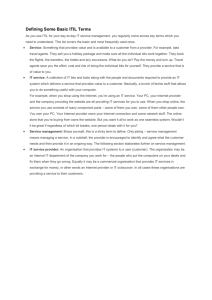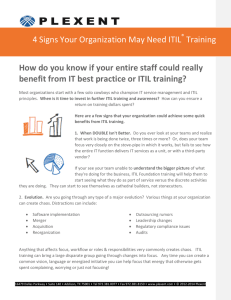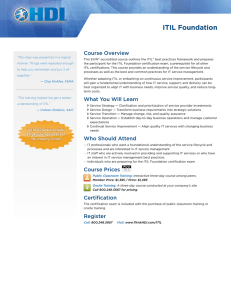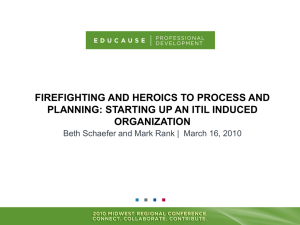ITIL® Service Operation
advertisement
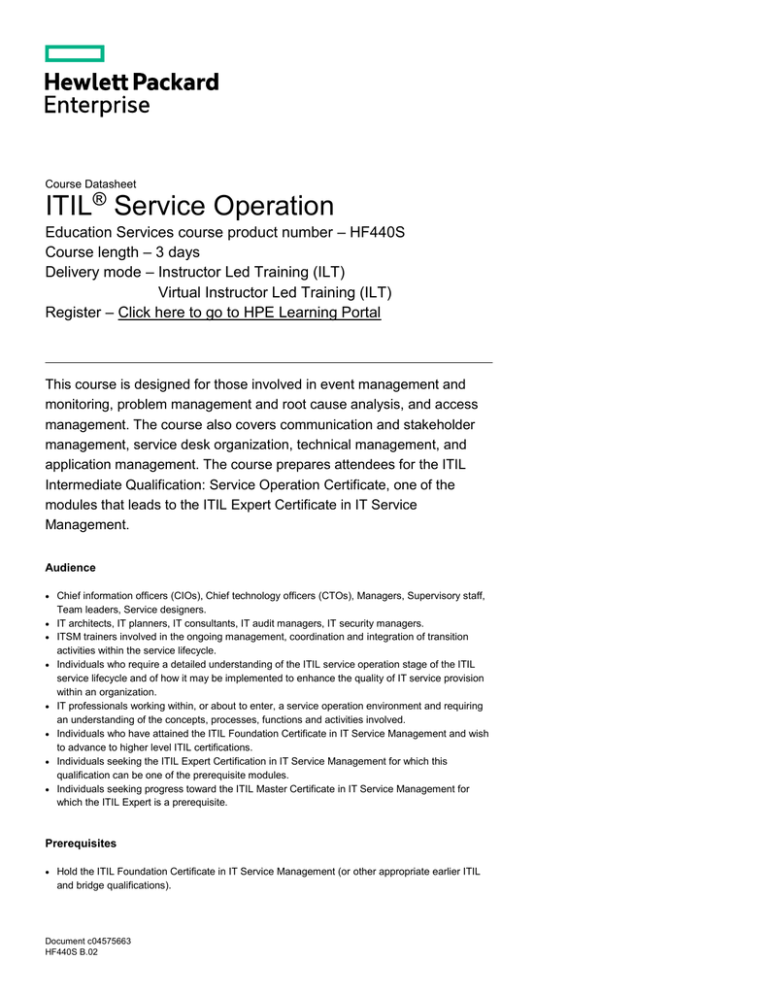
Course Datasheet ITIL® Service Operation Education Services course product number – HF440S Course length – 3 days Delivery mode – Instructor Led Training (ILT) Virtual Instructor Led Training (ILT) Register – Click here to go to HPE Learning Portal This course is designed for those involved in event management and monitoring, problem management and root cause analysis, and access management. The course also covers communication and stakeholder management, service desk organization, technical management, and application management. The course prepares attendees for the ITIL Intermediate Qualification: Service Operation Certificate, one of the modules that leads to the ITIL Expert Certificate in IT Service Management. Audience Chief information officers (CIOs), Chief technology officers (CTOs), Managers, Supervisory staff, Team leaders, Service designers. IT architects, IT planners, IT consultants, IT audit managers, IT security managers. ITSM trainers involved in the ongoing management, coordination and integration of transition activities within the service lifecycle. Individuals who require a detailed understanding of the ITIL service operation stage of the ITIL service lifecycle and of how it may be implemented to enhance the quality of IT service provision within an organization. IT professionals working within, or about to enter, a service operation environment and requiring an understanding of the concepts, processes, functions and activities involved. Individuals who have attained the ITIL Foundation Certificate in IT Service Management and wish to advance to higher level ITIL certifications. Individuals seeking the ITIL Expert Certification in IT Service Management for which this qualification can be one of the prerequisite modules. Individuals seeking progress toward the ITIL Master Certificate in IT Service Management for which the ITIL Expert is a prerequisite. Prerequisites Hold the ITIL Foundation Certificate in IT Service Management (or other appropriate earlier ITIL and bridge qualifications). Document c04575663 HF440S B.02 Course Datasheet A basic IT literacy and around 2 years IT experience are highly desirable. Undertake at least 21 contact hours (hours of instruction, excluding breaks, with an Accredited Training Organization (ATO) or an accredited e-learning solution), as part of a formal, approved training course/scheme. Complete at least 21 hours of personal study by reviewing the syllabus and the ITIL Service Operation publication in preparation for the examination. Course Objectives Candidates can expect to gain competencies in the following upon successful completion of the education and examination components related to this certification: Introduction to service operation Service operation principles Service operation processes Common service operation activities Organizing for service operation: functions Technology considerations Implementation of service operation Challenges, critical success factors and risks Detailed Course Outline Introduction to Service Transition - The purpose, objectives and scope of service operation. The value to the business. The context of service operation in the ITIL service lifecycle. The fundamental aspects of service operation and the ability to define them. Service Operation Principles - How an understanding of the basic conflict between maintaining the status quo and adapting to changes in business needs can lead to better service operation. - Other service operation principles including involvement in other lifecycle stages; understanding operational health; the need for good documentation and communication including a communication strategy. - Service operation inputs and outputs. Service Operation Processes - The use, interaction and value of each of the service operation processes: event management, incident management, request fulfilment, problem management, and access management. Common Service Operation Activities - How the common activities of service operation are coordinated for the ongoing management of the technology that is used to deliver and support the services. - How monitoring, reporting and control of the services contributes to the ongoing management of the services and the technology that is used to deliver and support the services. - How the operational activities of processes covered in other lifecycle stages contribute to service operation. - How IT operations staff should look for opportunities to improve the operational activities. Organizing for Service Operation - The role, objectives and activities of each of the four functions of service operation: service desk, technical management, IT operations management, and application management. - Service operation roles and responsibilities, where and how they are used as well as how a service operation organization would be structured to use these roles. Document c04575663 HF440S B.02 Course Datasheet Technology Considerations - The generic requirements of technologies that support service management across all lifecycle stages. - The specific technology required to support the service operation processes and functions. Implementation of Service Operation - Specific issues relevant to implementing service operation including managing change in service operation; assessing and managing risk in service operation; operations staff involvement in service design and service transition. - Planning and implementing service management technologies within a company. Challenges, critical success factors and risks - The challenges (e.g. engagement with staff outside service operation, justifying funding), critical success factors (e.g. management and business support, staff retention) and risks (e.g. loss of service) related to service operation. Recommended next courses Courses from the Lifecycle or Capability streams leading to the ITIL Expert qualification. Professional benefits The following credits are available for this course: 3 credits towards ITIL Expert certification 26 PDUs on Business & Strategy © Copyright 2016 Hewlett Packard Enterprise Development LP. The information contained herein is subject to change without notice. ITIL® is a registered trade mark of AXELOS Limited. Document c04575663 HF440S B.02
